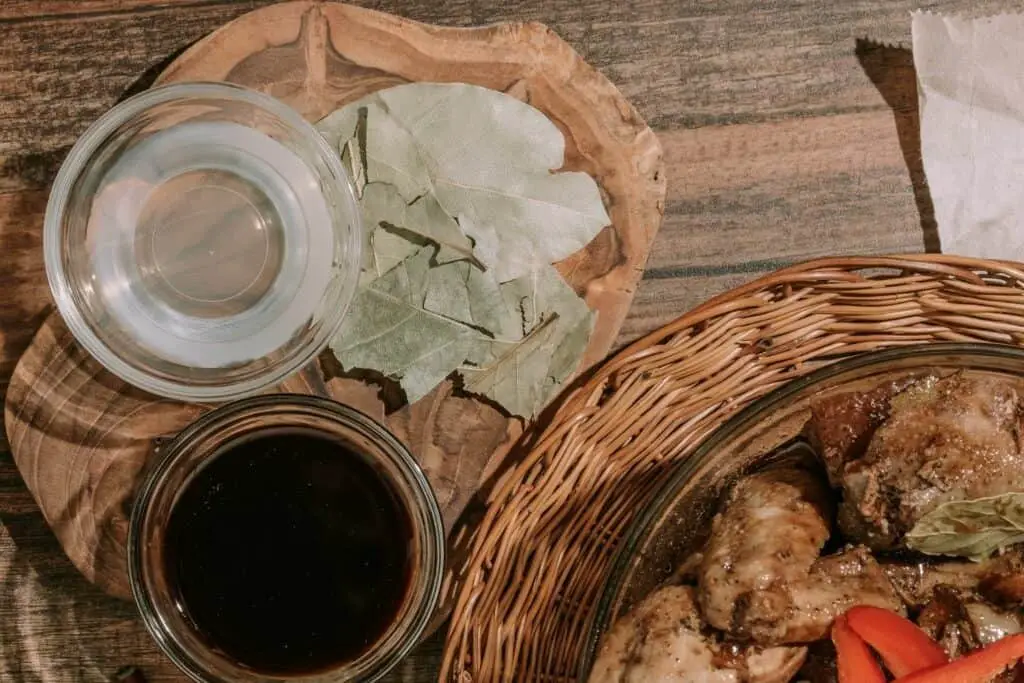
When making adobo, one of the main ingredients is vinegar. But have you ever wondered which type of vinegar is best used for Adobo, and which to avoid? In this article, we will discuss which type of vinegar is the best to use for Filipino adobo.
As a general rule, cane vinegar, apple cider vinegar, and white vinegar are the best types of vinegar to use for Filipino adobo. In contrast, balsamic vinegar and wine vinegar are the least popular option when cooking Filipino adobo.
Curious for more? Keep reading.
Best Vinegar To Use For Filipino Adobo
The best types of vinegars to use for Filipino adobo will be discussed in the sections below.
Cane Vinegar
Filipino adobo is a versatile dish that can be made with chicken, pork, seafood, or vegetables. While many types of vinegar can be used in the marinade and cooking process, cane vinegar has long been a traditional and preferred choice in Filipino cuisine.
Cane vinegar lends a subtle sweetness and depth of flavor to the dish, balancing out the savory ingredients. It also has milder acidity compared to other vinegars, which can become overpowering in the rich adobo sauce. For an authentic taste of Filipino adobo, reach for cane vinegar next time you’re cooking up this classic dish.
Apple Cider Vinegar
The vinegar in traditional Filipino adobo acts as a natural preservative and tenderizer for meat, allowing it to be cooked and stored at room temperature. Apple cider vinegar adds additional health benefits, such as containing vitamins, antioxidants, and amino acids that can boost immunity and digestion. Its mild yet tangy flavor also adds depth to the dish without overpowering the other ingredients.
When shopping for apple cider vinegar, look for ones labeled “with the Mother,” as this indicates that it has been fermented with all of its beneficial enzymes still intact. Try adding a splash to your next adobo dish for added flavor and nutrition.
White Vinegar
When it comes to Filipino adobo, there are many variations and debates as to what ingredients should be used. One key ingredient, however, is white vinegar. Its high acidity helps tenderize the meat while also breaking down tough connective tissue. It adds a subtle tanginess that balances out the rich flavors of soy sauce and garlic.
As an added benefit, vinegar also acts as a natural preservative, allowing adobo to be stored for longer periods of time without spoiling. Overall, white vinegar is an integral component in creating a delicious adobo dish.
Related Post: Ingredients Commonly Added To Adobo | Filipino Adobo With A Twist
Which vinegar is best for adobo?
When it comes to making adobo, there are a variety of vinegars that can be used. However, white vinegar tends to work best. It has a mild flavor that doesn’t overpower the dish, and its high acidity helps tenderize the meat and bring out its natural flavors.
Another option is apple cider vinegar, which adds a subtle hint of sweetness. However, be careful not to use too much as it can quickly become overwhelming. Rice vinegar is also commonly used in adobo, but it has a more delicate flavor that may get lost among the other ingredients. In the end, the best vinegar for adobo ultimately depends on personal preference and taste experimentation. When trying out different vinegars, be sure to add them gradually and taste as you go to find the perfect balance for your dish.
Can I use white distilled vinegar for adobo?
As any Filipino cooking enthusiast knows, adobo is a traditional dish made with vinegar-marinated meat or seafood. While there are many types of vinegar available, white distilled vinegar is not recommended for adobo because it lacks the depth and complexity of flavor that other varieties offer. Instead, try using cane or coconut vinegar, which can add a unique sweetness and depth to the dish.
For added depth and spice, try a vinegars flavored with garlic or chili peppers. Experimenting with different vinegars can help elevate your adobo to the next level. Don’t be afraid to try new ingredients; after all, that’s how great dishes are often discovered. However, if white distilled vinegar is all you have on hand, it will still work in a pinch – just don’t expect the same level of flavor as you would get from using specialty vinegars.
Can you use white wine vinegar in adobo?
When it comes to cooking, vinegar is a useful ingredient for adding acidity and balancing flavors in a dish. Traditionally, adobo recipes call for using cider or white vinegar. However, some cooks may prefer to use white wine vinegar instead, as it offers a more nuanced and subtly fruity taste. Keep in mind that white wine vinegar is made from white wine, so it may alter the flavor profile of your dish if you substitute it for regular white vinegar.
As with any substitution in cooking, it’s always best to use your own discretion and taste as you go to achieve the desired results. Overall, using white wine vinegar in adobo is possible, but it may alter the flavor and should be used with caution.
Related Post: What Meat Cuts Should You Use For Filipino Adobo?
Why do you add vinegar to adobo?
The addition of vinegar in adobo recipes serves two main purposes. First, it helps to tenderize the meat and add depth of flavor. Vinegar’s acidity also acts as a preservative, allowing adobo to be stored for longer periods of time without spoilage.
In traditional Filipino cuisine, a touch of vinegar is often added at the end of cooking as a final flavor enhancer. It adds brightness and balance to the dish’s rich, salty flavors. Additionally, vinegar has antibacterial properties which can aid in food safety during storage. Overall, adding vinegar to adobo not only enhances its taste but also extends its shelf life.
What type of vinegar is Datu Puti?
Datu Puti is a popular brand of vinegar in the Philippines, though it can be difficult to find outside the country. It is primarily distilled white vinegar, made from fermented sugarcane alcohol. This type of vinegar has a subtle flavor, making it suitable for use in a variety of dishes, as well as in making adobo.
Aside from using this vinegar in cooking adobo, Datu Puti vinegar can also be used as an all-purpose household cleaner or natural disinfectant, thanks to its high acidity levels. Overall, Datu Puti’s distilled white vinegar is a versatile kitchen staple for Filipino households and beyond.
Is Datu Puti white wine vinegar?
The popular Filipino brand Datu Puti produces a variety of vinegar products, including cane vinegar, coconut vinegar, and white vinegar. While the labels on their white vinegar bottles do feature grapes, this should not be confused with white wine vinegar. The process for making white wine vinegar involves fermenting actual white wine, while white vinegar is made by fermenting diluted distilled alcohol.
Though they may have similar flavors and uses in cooking, they are not interchangeable in recipes. So, to answer the question of whether Datu Puti white vinegar is actually white wine vinegar: no, it is not. It is simply a type of distilled vinegar.
What is Filipino vinegar?
Filipino vinegar, also known as sukang tuba, is traditionally made from coconut sap. The sap is allowed to ferment and then aged until it develops a tart, acidic flavor. It serves as a key ingredient in many Filipino dishes, including adobo and sinigang.
What is a substitute for Filipino vinegar?
If you are looking for a substitute for Filipino vinegar, there are several options to consider. Rice vinegar and cider vinegar both have similar levels of acidity and can be used in place of Filipino vinegar in most recipes.
Another option is to mix equal parts lemon or lime juice and white vinegar, which will provide a tangy flavor similar to that of Filipino vinegar. It’s important to note that these substitutes may not have the same depth of flavor as Filipino vinegar, but they should still work well in most recipes. As with all ingredient substitutions, it’s always best to taste and adjust seasoning as needed. Happy cooking!
Is rice vinegar the same as cane vinegar?
Many people often wonder if rice vinegar and cane vinegar are the same thing, but the answer is actually no. While both vinegars may have similar tastes and uses in cooking, they are made from different ingredients. Rice vinegar is made from fermented rice, while cane vinegar is made from fermented sugar cane juice or molasses.
The two also differ in terms of their color and level of acidity. Rice vinegar tends to be lighter in color and slightly milder in taste, while cane vinegar is darker and more intense in flavor. It ultimately comes down to personal preference when deciding which one to use in a dish, but it’s important to note that they are not interchangeable.
Is Silver Swan white vinegar?
The Silver Swan brand offers a variety of vinegar products, including white vinegar. This type of vinegar, also known as distilled vinegar, is made from grain and diluted with water to create a clear liquid. White vinegar has many uses, from cooking to cleaning to grooming. It can be used as a household cleaner or added to marinades and salad dressings for a tangy kick.
However, it is important to note that the Silver Swan brand also offers other types of vinegar, including apple cider and sukang tuba (coconut sap) vinegar. The specific ingredients and uses for each type vary, so it is important to check the label before purchasing or using the product.

